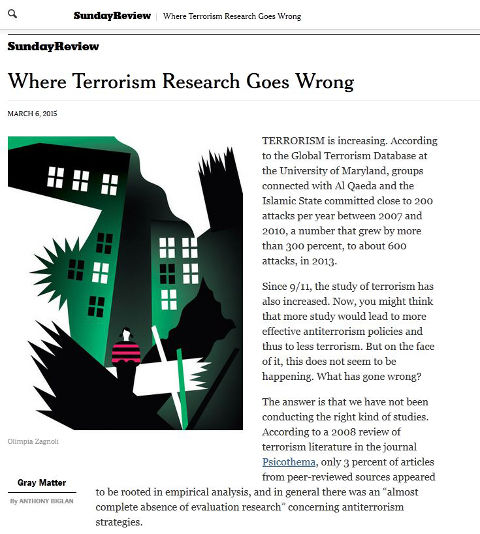Decisions around terrorism – everything from counter terrorism strategies, anti-terrorism legislation, travel advisories, security recommendations, etc. are more often made on whims and special interests than they are research. The news and analysis, from organizations like the U of M’s Study of Terrorism and Responses to Terrorism Global Terrorism Database are used to put forth the view that terrorism is a growing concern, while other empirical data shows that it is a relative small player in the overall misery on Earth. The Anthony Biglan looked at some of the peer reviewed research around terrorism to see how many studies have been conducted, the type of study designs and research methodologies that were used, and the preventative measures that may have been recommended. Terrorism related research seems scant at best even as governments are putting funds in place to better study and hopefully find ways to prevent terror attacks in the future.
“Jon Baron, who leads the Coalition for Evidence-Based Policy, which advocates for the use of randomized trials to evaluate government programs, reports that his organization has been able to identify only two experimental evaluations of antiterrorism strategies. One of them, a field experiment reported in a paper from a World Bank office in 2012, randomly assigned 500 Afghan villages to receive a development aid program either in 2007 or after 2011. The aid program had significant positive effects on economic outcomes, villagers’ attitudes toward the government and villagers’ perceptions of security. The aid program also reduced the number of security incidents, though that effect was not maintained after the program ended and was observed only in villages that were relatively secure before the program began.
Thus the study found an unequivocal but limited benefit of an aid program in reducing insurgent violence. I say “unequivocal” because randomizing villages to receive or not receive the aid made it extremely unlikely that differences in attitudes and security resulted from anything other than the aid program itself.” (New York Times)

Commentary on the (lack of) scientific research and studies on terrorism